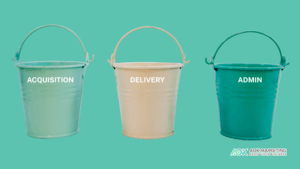A strong sales process is essential for any business that wants to succeed. It lets you track customer interactions, build relationships with prospects and clients, and boost your bottom line.
But many companies struggle with implementing an effective system that can help them manage these processes efficiently.
That’s where Customer Relationship Management (CRM) systems come in—they provide the tools needed to streamline your sales process and maximize revenue growth.
This article will explore how CRM systems can revolutionize your sales process, helping you achieve greater success in the long term.
What Is a CRM System and Why Does It Matter?
A CRM system is a tool that helps businesses manage customer relationships and sales processes. It’s designed to help you track leads, manage customer information, automate marketing campaigns, monitor customer satisfaction, and more.
CRM systems provide features such as automated lead tracking, contact management, sales analytics, reporting tools, document collaboration tools, and much more.
Using a CRM system can help businesses save time and money.
Businesses can reduce staff costs and increase efficiency by automating processes that would otherwise need to be done manually. The insights from sales analytics can be used to understand customer behavior better and create targeted marketing campaigns.
Businesses can improve customer service by quickly and accurately answering customer questions and responding to requests using a CRM system.
Overall, a CRM system can be invaluable for any business that wants to gain an edge over the competition by having access to better insights into customer behavior and sales processes. With the right tools and strategies, businesses can increase customer satisfaction and sales while reducing costs and improving efficiency.
Streamlined Sales Process
A CRM system can significantly streamline the sales process by providing sales teams with a centralized platform to manage and track customer interactions, deals, and data.
With the system’s help, sales representatives can easily access necessary information, such as prospect contact information, account history, and communication logs, thus increasing their efficiency and effectiveness in converting leads into customers.
Furthermore, a CRM system can automate manual tasks, such as data entry, scheduling, and follow-up reminders, reducing administrative burdens and allowing sales representatives more time to focus on closing deals.
The system can also enable sales teams to prioritize high-value opportunities and monitor sales performance through real-time reporting and analytics, allowing them to make data-driven decisions and adjust their strategies accordingly.
By centralizing customer data and automating crucial tasks, a CRM system can enhance collaboration and communication among sales teams, improving overall efficiency and streamlining the sales process.
Additionally, the system can enhance customer experience by personalizing sales interactions, providing timely follow-ups, and ensuring smooth hand-offs between sales representatives, enhancing the likelihood of repeat business and customer loyalty.
Therefore, implementing a CRM system can be a significant investment for any sales organization seeking to gain a competitive advantage and achieve sustainable growth.
Wells Fargo
Wells Fargo is considered one of the most successful examples of a company using CRM. Due to their large customer base, it is crucial for them to operate quickly with finances, manage data effectively, and communicate efficiently.
Wells Fargo uses the social aspects of CRM, such as social media connectivity and the ability to communicate rapidly with appropriate agents for customers needing help.
Such an approach significantly lightens the burden on their management and improves customer service and the company’s reputation.
Improved Customer Experience
A CRM system can make the customer experience better. It can help businesses keep track of customer information and their past purchases so that they can provide better service to them. It can also help businesses track customer feedback and complaints to identify areas for improvement.
Additionally, CRM systems can make it easier for customers to access the company’s website or contact support. With improved communication tools, customers can have their questions answered quickly and efficiently. This can lead to greater customer satisfaction, loyalty, and retention.
Lastly, a CRM system can help businesses personalize their service for each customer, making them feel special and important. This can help build strong relationships with customers and make them more likely to buy from the business again in the future.
By harnessing the power of a CRM system, businesses can greatly improve their customer experience, leading to greater satisfaction, loyalty, and retention. It’s an essential tool for any business that wants to keep its customers happy.
With an effective CRM system in place, businesses can create a better customer experience, leading to greater success and growth.
Improved Data Management
A CRM system can also help businesses manage and analyze data more effectively. It can store customer information such as contact details, purchase history, and preferences in a single central location. This makes it easier to access the data when needed.
With an effective CRM system in place, businesses can track customer activity across all channels, such as website visits, emails sent, calls made, and more. This helps identify customer trends and behaviors.
Additionally, insights from this data can help businesses improve their marketing campaigns, develop better products and services, and optimize their processes.
Overall, a CRM system enables businesses to understand their customers better and deliver personalized experiences that lead to improved customer loyalty.
It’s one of the most powerful tools available to businesses today and can greatly improve their operations. With a CRM system, businesses can better manage customer data and take advantage of valuable insights to make more informed decisions.
Increased Sales
A CRM system can help businesses increase their sales. It helps sales teams identify potential customers and target them with timely offers or personalized messages. Additionally, it makes tracking customer interactions over multiple channels easier for sales staff to understand better how customers engage with the business.
In addition, a CRM system makes it easier to track customer buying behaviors, which can help sales teams better target customers with offers that are most likely to be effective. Additionally, a CRM system makes it easy for sales teams to identify cross-selling opportunities and upsell additional products or services.
Finally, having access to comprehensive customer profiles helps sales teams improve their communication with customers and build better relationships. Such improvements in customer service can lead to increased sales as customers feel more engaged and valued by the business.
Overall, a CRM system can majorly impact businesses looking to increase their sales.
Businesses can more effectively engage with customers and increase their sales by providing deeper insights into customer buying behaviors, cross-selling opportunities, improved customer service, and targeted offers.
Final Thoughts
A CRM system is essential for any business looking to increase customer satisfaction, loyalty, and retention. It provides valuable insights into customer behavior and helps businesses better manage customer data.
Additionally, a CRM system enables businesses to personalize their service for each customer, improving their overall experience. Lastly, it can help businesses target customers with timely offers and increase sales.
With a CRM system in place, businesses can greatly improve their operations and grow their customer base. It’s a powerful tool that every business should consider implementing.
The key to success is finding the right CRM solution for your business. Research and compare different options to find one that fits your needs and budget. With the right system in place, you can maximize customer satisfaction, loyalty, and sales. Good luck!
About The Author
Dave Burnett
I help people make more money online.
Over the years I’ve had lots of fun working with thousands of brands and helping them distribute millions of promotional products and implement multinational rewards and incentive programs.
Now I’m helping great marketers turn their products and services into sustainable online businesses.
How can I help you?






